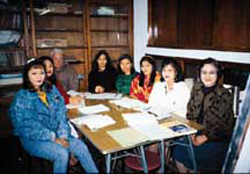A Life Filled With Joy
Fifty years among the Japanese people
By Fr. Alex Mcdonald, S.F.M.
March 2002
Return to Table of Contents
Print Article
Recently an elderly couple dropped in to see me. “Do you remember us?” they asked. After looking intently at them for a while I had to admit that I had no recollection of them.
“The name is Kozera. You did our marriage 45 years ago in the church at Muta no Hara.” Muta no Hara was the first church I built. It was a mission of the parish of Kaize in the diocese of Nagasaki.
“How are things in Muta no Hara?” I asked.
“Well, the church you built has crumbled to dust,” Mr. Kozera replied. “Nobody lives there anymore. We all moved out long ago. We’re now living near Nagoya.”
I remember how proud I was of my first church, especially on the day of the blessing by Archbishop Yamaguchi of Nagasaki so many years ago. “Crumbled to dust...” However, the Kozeras are still happily married and fervent in the faith, so it does not really matter that my once pride and joy, the church of Muta no Hara, is no more.
Looking back on 50 years of priesthood in Japan, there are many things I cannot remember, like the Kozera’s wedding and numerous other weddings since. But I do remember my first catechumen (one who is studying the Catholic faith). She was a young woman by the name of Miss Kawakami who climbed the hill to the church and placed a bouquet of flowers in front of Mary’s statue. She told me that she wanted to study to become a Christian.
It was 1955, three years after my arrival in Japan and I was pastor of the parish of Kaize in Nagasaki. My Japanese at that time must have been pretty awful, but the young woman persevered and after a year of instruction she became my first baptism.
Since that time I have never had large classes of catechumens, but there never was a time when I had no catechumens. To be the Lord’s instrument in bringing a person to a greater knowledge of God and to the grace of baptism has been a great source of happiness for me over the years.
Among those I baptized, three have been in the convent for more than 25 years and one man joined the Trappists. I remember a humourous incident that occurred while teaching the catechism to the man who later joined the Trappists. At the time he was a farm boy in Muta no Hara. It was at the beginning of the catechism and I was explaining how the order in the universe is proof of the guiding hand of an intelligent God and if God withdrew His guiding hand, chaos would result. The analogy I used was that of a speeding bus.
Bringing a person to a greater knowledge of God and to the grace of baptism has been a great source of happiness for me over the years.
“What would happen,” I asked him, “if the driver of the speeding bus suddenly jumped out?” I was expecting him to answer that the bus would careen out of control, but instead, without any hesitation, he immediately shot back, “The driver would get badly hurt.” I couldn’t fault him for that answer, but I had to quickly come up with another example to explain the guiding hand of God.
Another source of consolation has been the countless opportunities to assist the dying. On a number of occasions, when the doctor had given up all hope, the sick person was miraculously cured after receiving the sacrament of the sick.
One man, dying of stomach cancer and as thin as a broomstick, had only a few hours to live. When I arrived to give him the last rites, his hospital room was crowded with family and relatives tearfully awaiting the end. A week later he walked out of the hospital and lived cancer-free until his death ten years later in a motorcycle accident.
Over 40 years ago while our founder Monsignor Fraser was with us here in Japan, I remember a discussion we had with him about vocations to Scarboro Missions. One of our group mentioned that the sacrifices involved in the missionary life is a deterrent to vocations to the Society.
“Oh my!” exclaimed Monsignor. “A missionary life is no sacrifice. It’s a life filled with joy.”
Looking back over the 50 years, I can see Monsignor’s point. The joys have indeed outweighed the sacrifices.
Return to Table of Contents
Print Article
